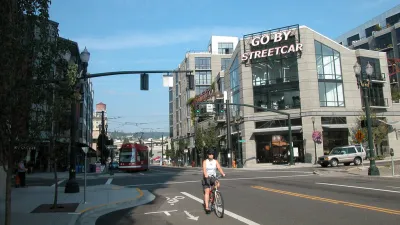The Portland City Council moved quickly in proposing and revising a "street fee" to finance repairs on the city's crumbling roads. Now a more realistic calendar seems to be in place for considering the fee on residents and businesses.

Brad Schmidt reported on the details of the "street fee" (the Portland Bureau of Transportation's website calls it a "Transportation User Fee") when city officials announced the proposed charge on residents and businesses last week: "The 'transportation user fee' would cost the typical household $11.56 a month; poorer households would pay $8.09 a month and owners of apartment complexes would be charged $6.79 per unit, with a discount for multifamily complexes that cater to lower-income residents. Businesses and other government institutions, including city agencies and school districts, also would be charged."
According to the initial draft proposal for the fee, "at least 80 percent of revenue from the new fee would go for maintenance and safety improvements. Up to 20 percent could be spent on 'other transportation services,' including paving unimproved streets, mass transit and covering administrative costs."
Since the initial announcement, the City Council has quickly tweaked and prodded the fee. Schmidt wrote another article detailing the how and why of why the fee ended up on the fast track of the city's legislative agenda. The calendar for the fee has now changed, as have the details. Now, "instead of charging homeowners a monthly fee of $11.56 a month, the city would incrementally raise fees annually from $6 to $9 to $12." Moreover, "Residential fees wouldn't go into effect unless the city approves the proposed charges on business. Both sets of fees would begin July 1, 2015."
In yet another report, Andrew Theen provides a breakdown of how the revenue generated by the fee would be spent by the city.
FULL STORY: Portland street fee would cost typical household almost $140 a year

National Parks Layoffs Will Cause Communities to Lose Billions
Thousands of essential park workers were laid off this week, just before the busy spring break season.

Retro-silient?: America’s First “Eco-burb,” The Woodlands Turns 50
A master-planned community north of Houston offers lessons on green infrastructure and resilient design, but falls short of its founder’s lofty affordability and walkability goals.

Delivering for America Plan Will Downgrade Mail Service in at Least 49.5 Percent of Zip Codes
Republican and Democrat lawmakers criticize the plan for its disproportionate negative impact on rural communities.

Test News Post 1
This is a summary

Test News Headline 46
Test for the image on the front page.

Balancing Bombs and Butterflies: How the National Guard Protects a Rare Species
The National Guard at Fort Indiantown Gap uses GIS technology and land management strategies to balance military training with conservation efforts, ensuring the survival of the rare eastern regal fritillary butterfly.
Urban Design for Planners 1: Software Tools
This six-course series explores essential urban design concepts using open source software and equips planners with the tools they need to participate fully in the urban design process.
Planning for Universal Design
Learn the tools for implementing Universal Design in planning regulations.
EMC Planning Group, Inc.
Planetizen
Planetizen
Mpact (formerly Rail~Volution)
Great Falls Development Authority, Inc.
HUDs Office of Policy Development and Research
NYU Wagner Graduate School of Public Service



























